Report on the Fifth Kyoto Kokoro Initiative Symposium, “Kokoro and the Corona Crisis”
The Fifth Kyoto Kokoro Initiative Symposium, “Kokoro and the Corona Crisis,” was held online on February 21st, 2021. The Kyoto Kokoro Initiative, which is sponsored by the Inamori Foundation, had previously held five symposia since its launch in 2015: “Kokoro and History” (the first), “In and Out of Kokoro” (the second), “Kokoro and Symbiosis” (the first international symposium), “Kokoro and Ways of Life: What is the Self?” (the third) and “Kokoro and the Artificial Mind” (the fourth).
Although the second international symposium, which had originally been planned for fall 2020, was postponed by a year due to the spread of COVID-19, the board decided to organize the fifth symposium under the theme “Kokoro and the Corona Crisis” with an aim to address issues concerning kokoro (meaning “mind”, “soul” or “psyche” in Japanese) during the Corona pandemic. Speakers at the symposium questioned what impact and meaning the pandemic has had on the human mind from the viewpoints of medicine, Buddhist studies and psychology.
Three lectures took place following an opening address from Prof. Toshio Kawai (Director, KRC, Kyoto University).
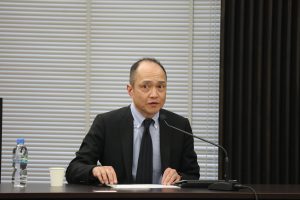
Toshio Kawai (Director, KRC, Kyoto University)
The first lecture was given by Prof. Taro Yamamoto (Professor, Nagasaki University), entitled “A Sketch for the ‘With-Corona’ Era.” In the lecture, Prof. Yamamoto first explained that it is unfeasible to eradicate Covid-19 and thus important to consider ways of living with the virus while preventing the healthcare system and social infrastructure from collapsing. He then proposed the significance of thinking “in the shoes of a virus;” as viruses depend on hosts to parasitize, viruses and humans must essentially coexist. Lastly, Prof. Yamamoto showed how previous pandemics, such as the medieval plague, helped accelerate social changes, and he concluded that addressing various issues faced by modern society – the advancement of technology, international cooperation, the population problem, the environmental issues, among others – will play a key role in envisioning a society in the “with-Corona” era.
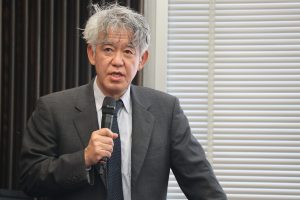
Taro Yamamoto (Professor, Nagasaki University)
Prof. Seiji Kumagai (Associate Professor, KRC, Kyoto University) followed with the second lecture, “Rethinking the Corona Crisis in Light of Buddhist Ideas on Kokoro.” Using the Buddhist concepts of “hetu” and “pratyaya”, Prof. Kumagai first explained that while a biological crisis is caused by COVID-19 being “hetu” (direct cause), mental, social, financial, and physical crises, as well as those met by the socially vulnerable that emerged during the pandemic, are induced by COVID-19 embodying” pratyaya” (indirect cause). Therefore, these issues are less concerned with the eradication of the virus than with the problems of our mind. Prof. Kumagai then introduced the historical account of Eison and Ninshō, the Japanese Shingon Risshu priests who helped leprosy patients during the Kamakura period, and suggested that Buddhist ideas can teach us ways to accept the vulnerability of both ourselves and others, and therefore live better through the pandemic.
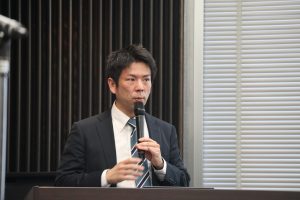
Seiji Kumagai (Associate Professor, KRC, Kyoto University)
The third lecture, “The Corona Crisis and Psychotherapy,” was presented by Prof. Yasuhiro Tanaka (Professor, Graduate School of Education, Kyoto University). Prof. Tanaka first explained that after the Great East Japan Earthquake in 2011, psychotherapy sessions more often involved cases in which the disaster triggered vulnerability, which had already existed within the individuals and families, to emerge as problems, rather than sessions in which the disaster itself became the source of trauma. Similarly, during the coronavirus crisis, patients often “make use” of the pandemic. Following on this, Prof. Tanaka observed that the pandemic is accelerating the shifts in the zeitgeist that had already been occurring before the outbreak, such as the permeation of online therapy and the increasing avoidance of in-person communications among university students. Lastly, after describing that the Japanese mind values “oneness,” such as eclecticism and syncretism, Prof. Tanaka pointed out that while the Japanese are often forbearing of pending situations, they are also prone to indecisiveness. In conclusion, he suggested that the important role of therapists during the pandemic is to support patients in making individual decisions.
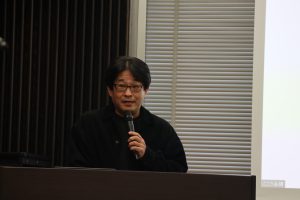
Yasuhiro Tanaka (Professor, Kyoto University)
After the lectures, the three speakers joined Prof. Kawai in a discussion. As “coexistence” emerged as a keyword linking the three lectures, they discussed the ways in which humans can live together with the virus and nature. Various opinions were also expressed over the “new proximity” brought forth by the pandemic and its issues.
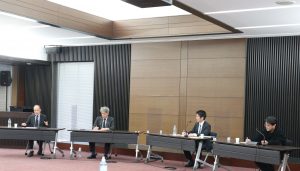
General Discussion
At the end of the symposium, Prof. Norihiro Tokitoh (Executive Vice-President for Research, Evaluation, and Industry-Government Academia Collaboration, Kyoto University) gave closing remarks. Prof. Yukiko Uchida (Professor, KRC) served as the emcee of the day, and 344 viewers participated in the event in total.
Videos of the lectures and discussion will be available soon on the KRC website and Kyoto-U Open Course Ware (Japanese version only).
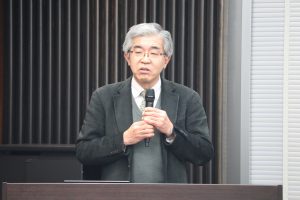
Norihiro Tokitoh (Executive Vice-President, Kyoto University)
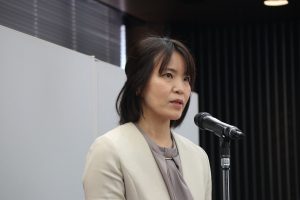
Yukiko Uchida (Professor, KRC)
Flyer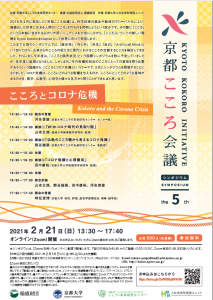
[DATA]
Date and Times: February 21st (Sunday) 13:30 – 17:40 (held online)
Intended audience: Researchers, students, and the general public
Attendee: 344
[Program]
13:30 – 13:40 Opening remarks Toshio Kawai (Director, Kokoro Research Center, Kyoto University)
13:40 – 14:30 Lecture 1 “A Sketch for the ‘With-Corona’ Era” Taro Yamamoto (Professor, Nagasaki University)
14:30 – 15:20 Lecture 2 “Rethinking the Corona Crisis in Light of Buddhist Ideas on Kokoro” Seiji Kumagai (Associate Professor, KRC, Kyoto University)
15:20 – 15:30 Break
15:30 – 16:20 Lecture 3 “The Corona Crisis and Psychotherapy” Yasuhiro Tanaka (Professor, Kyoto University)
16:20 –16:30 Break
16:30 – 17:30 General Discussion Taro Yamamoto, Seiji Kumagai, Yasuhiro Tanaka, Toshio Kawai
17:30 – 17:40 Closing remarks Norihiro Tokitoh (Executive Vice-President for Research, Evaluation, and Industry-Government Academia Collaboration, Kyoto University)
Hosted by Kokoro Research Center, Kyoto University
Sponsored by The Inamori Foundation
Co-hosted by Unit of Kyoto Initiatives for the Humanities and Social Sciences
2021/05/12